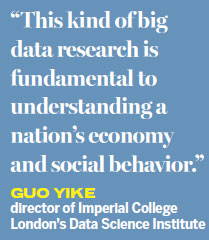Big data requires big vision
Updated: 2016-08-05 08:11
By Wang Mingjie(China Daily Europe)
|
|||||||||
Wealth of information on Chinese online payments shows how research can explain social phenomena
Big data is unlocking the mysteries behind China's consumer behavior, but the nation needs to focus more on social impact to spot opportunities and risks, according to top London academic Guo Yike.
The founding director of Imperial College London's Data Science Institute says the shift in China toward digital payment tools, facilitated by a well-developed Internet infrastructure, means it is now a lot easier to see how citizens are spending their money.
|
Guo Yike warns the use of personal data is a double-edged sword. Provided to China Daily |
As people hardly use paper money anymore, "consumer behavior is completely reflected in the use of internet payments, which is not quite the case yet in Western countries", he says.
For Guo, the scale of the data is overwhelming. The example he cites is Alipay, Alibaba Group's online payment platform, which handles more than 200 million transactions a day. No similar service in the West comes close to that figure, he says.
"This kind of big data research is fundamental to understanding a nation's economy and social behavior."
China has put a lot of effort into big data innovation and research, and its unique strength can be seen in areas such as the healthcare system, he says. "It already has a pretty modern infrastructure to accumulate patient information. Also, due to the centralized system, all hospital data is under unified management, a great resource for the future of personalized medicine."

However, the use of personal data is a double-edged sword, he warns. "It means you know more about people. Big data characterizes individuals using a set of measurements, which means I know you more, so I can make products for your benefit or interests," he explains. "Yet it also means I can do something that you really don't like.
"What we have to do is develop a mature legal system and make different social conventions to ensure information on individuals is respected and used properly."
The internet economy and big data innovation are two key areas for the Chinese government. However, Guo says the emphasis now lies too much on the technology, finding new products and industries, while research in the West tends to focus more on understanding the social impact.
He believes big data in the West could revolutionize medicine, as with more accessible data, healthcare could become more personalized, theoretically allowing patients to choose a doctor based on their own understanding, illness or income.
"As a result, we may see doctors dissociate from hospitals to offer private services. We could potentially have an Uber for doctors. That's a key example of how big data could change the entire medical care structure."
This is the kind of research being done in Western countries, he says, adding that if China fails to realize the importance of social impact, the country may not see certain opportunities or risks, and will not have enough insight to set the rules in the future.
Guo, who was born in Shanghai, gained a first-class honors degree in computer science from Tsinghua University in the 1980s before getting his PhD in computational logic at Imperial College London about a decade later.
He has worked extensively on technology and scientific data analysis platforms, with his research focusing on knowledge discovery, data-mining and large-scale data management.
In 1999, he founded InforSense, a software company for life sciences and healthcare data analysis, and served as CEO for several years before its merger in 2009 with IDBS, an advanced research and development software provider.
Overall, Guo thinks China should change its mentality of always playing catch-up. "In many areas, it's an advanced country, so it should think about how developments contribute to mankind, not just to China."
Based on the scale of data on online payments, he says China should make a major contribution to deciding what kind of mechanisms, financial rules, conventions and legal systems can be designed, and what kind of impact the internet economy will have on banks.
"As someone of Chinese origin, I understand how different it is in China to make payments nowadays, but how many people outside China notice that? Very few," he says. "So, just speak about it, research about it, tell people, make a contribution and encourage people to study it.
"In many areas, China is in the lead, but they don't know it. They do not wish to know, and they do not dare to know, that's the problem."

In the past decade, Imperial College London has become China's No 1 research collaborator in Britain. The college's Chinese partners include Huawei Technologies; scientific institutes at Tsinghua, Zhejiang and Peking universities; and the Chinese Academy of Sciences.
President Xi Jinping was given a tour of two of the college's facilities, one being the Data Science Institute, during his historic state visit to the UK in October.
Guo presented data analysis on human migration to the Chinese leader, as he thinks understanding people's movements, and the consequences of that movement, is important for policymaking.
The research results reflected some interesting facts, he says. For example, young people from Zhejiang province tend to migrate to provinces like Henan, which is not an obvious choice.
"The reason this happened is largely because of the entrepreneurial opportunities in Henan, which have been generated by the building of logistic centers in (provincial capital) Zhengzhou, a major railway hub, and by preferential policies. That's quite an interesting result."
wangmingjie@mail.chinadailyuk.com
(China Daily European Weekly 08/05/2016 page32)
Today's Top News
London unveils new anti-terror unit amid knife attack
Bank of England cuts rates to record low, restarts QE
Woman killed, five injured in London knife attack
Fury at Republican Party over Trump snub of Ryan
Ukraine's Savchenko on hunger strike
Chinese tourists robbed in France
5 feared dead as Russian helicopter shot down
China influence can soften blow of Brexit
Hot Topics
Lunar probe , China growth forecasts, Emission rules get tougher, China seen through 'colored lens', International board,
Editor's Picks

|

|

|

|

|

|








